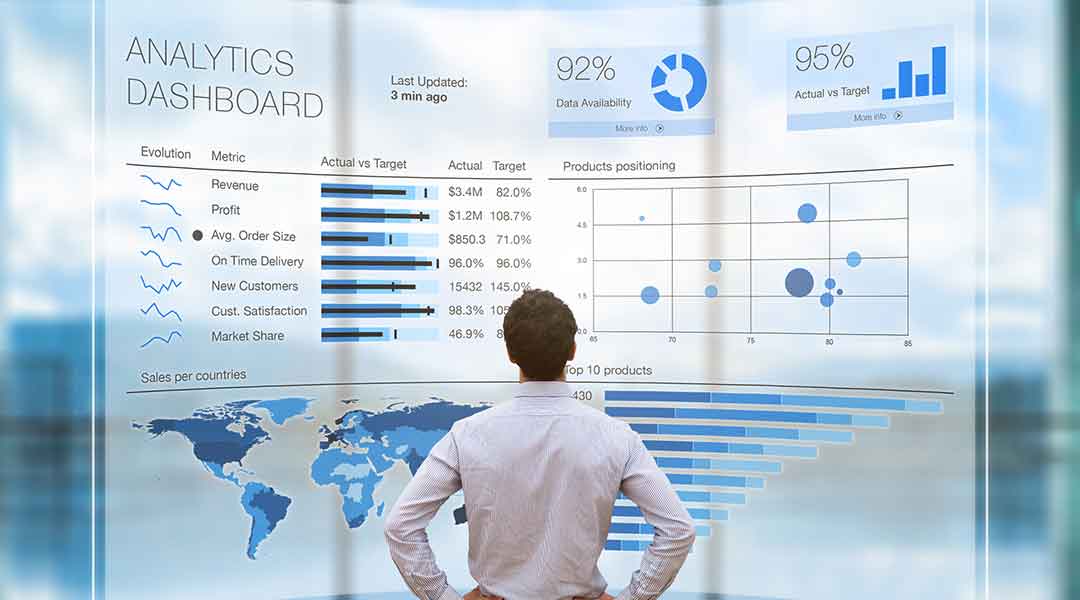AI transforms how we approach digital marketing. Through the synergistic combination of machine learning and natural language processing, this advanced system demonstrates intelligence that is remarkably similar to our own.
Artificial intelligence has remarkable powers of assimilation, able to handle mountains of data, coax out valuable takeaways, and treat customers like royalty, no matter how many. For you as marketers, this means more efficient workflows and the ability to adapt strategies based on deep data analysis.
From manufacturing to healthcare, AI is making a real difference by automating tedious tasks and providing customers with more personalized experiences. Today’s fast-paced market doesn’t reward gradual adaptors; embracing AI within your strategy accelerates your competitive edge.
What if you could make your digital marketing campaigns more effective? AI is the secret sauce that can make it happen. No sooner is data harvested than it’s helping businesses mint fresh connections with their clientele, intimate interactions that linger long after the sale.
Understanding AI in Digital Marketing
Understanding AI in digital marketing involves leveraging technology to boost your strategy’s effectiveness. Here, we focus on using intelligent algorithms for better consumer insights and task automation.
- Personalization: By employing machine learning models, you can tailor content to individual preferences. This approach increases engagement by showing users exactly what interests them. For example, Netflix uses similar technologies to recommend shows; your brand can do this, too, with emails or website content.
- Enhanced Search Capabilities: Natural Language Processing (NLP) makes it possible for AI systems to understand user queries more effectively. This is how Google delivers relevant search results so quickly. By applying NLP techniques to your website, you ensure visitors find what they’re looking for effortlessly.
- Visual Content Optimization: Computer vision allows machines to interpret images similarly to how humans do. This tech underpins applications like Pinterest’s visual search tool. Implementing image recognition features helps customers discover products through pictures alone, boosting interactivity and potentially sales figures as well. Each of these points demonstrates a strategic application of AI that could significantly impact digital marketing outcomes if correctly implemented.
Benefits of AI in Digital Marketing
With AI in the mix, your digital marketing strategy goes from vague to vivid, thanks to access to high-powered analytical tools. Suddenly, you can catapult customer experiences from bland to grand with AI. It’s like having a personal advisor—this system studies user preferences, then drafts email campaigns that feel tailor-made, speaking to users on their own terms.
On efficiency, think less manual grunt work and more strategic planning. A weight is lifted off your shoulders as AI assumes responsibility for the monotony of sorting emails and configuring ad bids. Two benefits in one—this redesigned workflow not only reduces wasted time but also refocuses energy on high-priority areas.
In creative thinking and campaign innovation. When diving into data analysis, AI stands unmatched. Imagine having your most elusive marketing questions answered in a flash—this lightning-fast datacomber does just that, discovering concealed gems and sorting the crowd to spot high-scoring segments.
What does this technology do? It fine-tunes your targeting, eliminates waste, and puts more money back in your pocket, all while you enjoy vastly improved campaign performance. Here’s the silver lining: real-time data processing means your strategies can shift gears quickly to match changing consumer behaviors and competitive landscapes, snagging every opportunity that comes your way.
Key Applications of AI in Digital Marketing
AI in digital marketing opens up new avenues for engaging with your audience and refining your strategy. Here’s how you can leverage its potential effectively:
- Chatbots like Drift and Intercom use AI to offer personalized support at any time of day. They help collect leads by engaging users in conversation, which directly boosts conversion rates.
- Predictive analytics powered by AI allows you to understand customer behaviors better. This tech forecasts demand, enhances inventory management, predicts churn, enables proactive measures for retention, and refines sales projections using data insights.
- Programmatic advertising benefits from AI by automating ad placements based on user behavior. It ensures ads reach the right people at the right moment by targeting specific audience segments identified through AI-driven analysis.
These applications showcase just a fraction of what’s possible when integrating artificial intelligence into digital marketing strategies.
Choosing the Right AI Tools for Your Business
Choosing the right AI tools for your business is crucial. Here are three key points to consider:
- Budget: Your financial resources dictate which tools you can adopt.: Don’t stretch your budget thin on overly expensive options. Affordable doesn’t always mean low quality; some cost-effective tools offer remarkable features that fulfill most digital marketing needs effectively. Researching and comparing different AI tool prices alongside their functionalities ensures a balanced decision.
- Scalability: Tools must evolve with your expanding strategy.: As your business grows, so will its operational complexities and data volume requirements in digital marketing efforts, which demand flexible solutions capable of handling increased loads without lagging efficiency or requiring constant replacements. Ensure lasting compatibility over time by opting for highly adaptable platforms from the start.
- Executing Integration smoothly involves matching new tech with current systems.: Challenges arise if chosen AI solutions clash with pre-existing software versions employed within operations—thoroughly checking tool compatibilities before integration eliminates such potential setbacks and also saves valuable transition time following installation. Companies find peace when they deploy seamlessly meshing technology, enhancing productivity immediately upon acquisition.
Challenges and Limitations of AI in Digital Marketing
Exploring the challenges and limitations of AI in digital marketing reveals some key hurdles you might face.
- Over-reliance on Automation: Too much trust in automation can make your marketing feel impersonal. Consumers value unique, creative content that speaks to them on a personal level. An all-automated approach risks missing these nuances, making messages seem generic or out of touch. Striking the right balance between AI-driven efficiency and human creativity is essential for resonating with audiences.
- Data Privacy Concerns: Navigating data privacy laws like GDPR is critical but challenging with AI technology. Using consumer data without violating these regulations requires careful planning and execution by businesses involved in digital marketing exercises, including collection, analysis, or processing activities… Failing to comply may not only lead to hefty fines but also damage your brand’s reputation among concerned consumers about how their information is used.
- Need for Human Oversight: Despite its benefits, AI cannot run autonomously without supervision. Tools must be regularly monitored. Why? This is to prevent errors that could misrepresent your brand or send inappropriate messaging. Ensuring alignment with company values and objectives also necessitates periodic checks. Finally, proper oversight aids in adapting strategies based on performance analytics, ensuring continuous improvement.
How to Start Implementing AI in Your Strategy
To start using AI in your digital marketing, first identify areas needing improvement. Look for repetitive tasks or spots where data can boost results. Pick AI tools that match your goals and clearly help you achieve more.
Always train your staff well to use these new technologies without issues. It’s crucial to keep an eye on how things are going once you’ve started applying AI. Make adjustments based on what the data shows to get even better outcomes over time.
Don’t rush it; introduce AI gradually so everything runs smoothly and everyone gets used to the changes easily. This approach helps minimize problems and ensures everyone adapts well, making sure your move toward using AI is as effective as possible.
- Enhance Efficiency: AI tools automate the mundane, freeing you to focus on strategy. This means less time spent on tasks like data analysis and more time on creative campaigns. By streamlining operations, AI reduces errors and increases productivity. Start using AI now for a leaner marketing approach.
- Personalize Your Strategy: Customers expect tailored content; AI makes this easy. Using customer data, AI can predict preferences and customize outreach accordingly. This leads to better engagement rates and higher satisfaction scores among your audience members. Incorporate personalization into your digital marketing with the smart use of AI insights.
- Balance Automation with Creativity: While automation is great, never forget the human touch that sparks interest in an increasingly noisy online space! Combining technical efficiency from bots or algorithms alongside captivating story-telling keeps brands relevant today. Businesses must fuse artificial intelligence’s analytical capabilities without sidelining creativity in communicating their narratives.
Pro Tips
- Affordable Content Creation: Small businesses can leverage AI for cost-effective content creation. Begin with tools like ChatGPT to generate articles, blogs, or social media posts. With this approach, production gets a shot in the arm, and your wallet gets a break from hefty hiring costs. Put your content to the test: publish a mix of formats and gauge which ones spark the most engagement.
- Smarter CRM Management: Utilize HubSpot’s AI functionalities to manage customer relationships more efficiently. Skip the manual crunching and guesswork. By seamlessly pinpointing audience segments, tailoring messages to resonate, and forecasting customer behaviors, you’ll witness engagement skyrocket, and sales swell without mental resources sunk into the analysis.
- Refining Marketing Strategies: Always run A/B tests on your AI-driven campaigns to gauge their effectiveness accurately; data insights gained from these tests are invaluable. Use this feedback loop methodically to tweak strategies aiming at better performance metrics. This continuous improvement cycle ensures gradually maximizing return on investment over time by optimizing every aspect of the campaign based directly on user response data.
Let’s bring this full circle—shall we? With AI in the mix, digital marketing escalates to new heights, courtesy of precision-crafted analytics and lightning-fast automation. Pinpoint your target audience, stay one step ahead of the competition with accurate forecasts, and minimize the friction in every customer exchange—this technology is the behind-the-scenes magic that makes it all happen.
Remember to start small: test AI tools that fit well within existing strategies before fully committing. Sparking real emotional connections requires a delicate balance of creative passion and analytical precision—the perfect union of human and machine.










